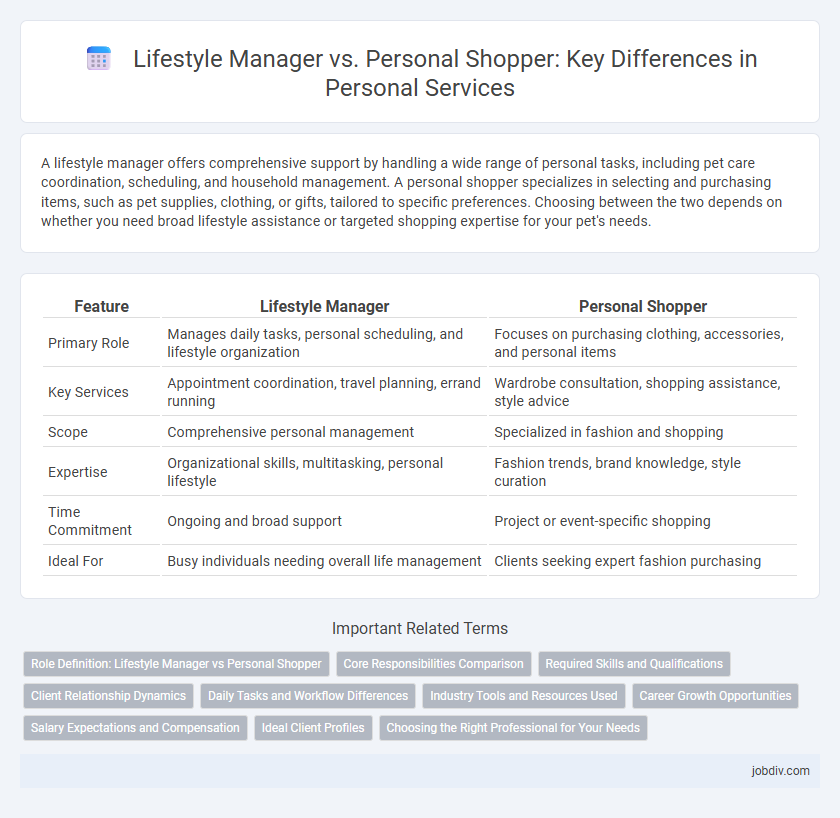A lifestyle manager offers comprehensive support by handling a wide range of personal tasks, including pet care coordination, scheduling, and household management. A personal shopper specializes in selecting and purchasing items, such as pet supplies, clothing, or gifts, tailored to specific preferences. Choosing between the two depends on whether you need broad lifestyle assistance or targeted shopping expertise for your pet's needs.
Table of Comparison
| Feature | Lifestyle Manager | Personal Shopper |
|---|---|---|
| Primary Role | Manages daily tasks, personal scheduling, and lifestyle organization | Focuses on purchasing clothing, accessories, and personal items |
| Key Services | Appointment coordination, travel planning, errand running | Wardrobe consultation, shopping assistance, style advice |
| Scope | Comprehensive personal management | Specialized in fashion and shopping |
| Expertise | Organizational skills, multitasking, personal lifestyle | Fashion trends, brand knowledge, style curation |
| Time Commitment | Ongoing and broad support | Project or event-specific shopping |
| Ideal For | Busy individuals needing overall life management | Clients seeking expert fashion purchasing |
Role Definition: Lifestyle Manager vs Personal Shopper
A Lifestyle Manager coordinates and oversees multiple aspects of a client's daily life, including scheduling, travel planning, and event management, providing comprehensive support beyond shopping needs. A Personal Shopper specializes in selecting and purchasing clothing, accessories, and gifts tailored to the client's style and preferences. The Lifestyle Manager's role encompasses broader responsibilities, while the Personal Shopper focuses specifically on retail and fashion-related tasks.
Core Responsibilities Comparison
A Lifestyle Manager oversees comprehensive daily tasks, including event planning, travel coordination, and personal errands, ensuring seamless management of a client's overall lifestyle. In contrast, a Personal Shopper specializes primarily in purchasing items such as clothing, gifts, and household products tailored to the client's preferences and needs. Both roles require exceptional organizational skills, but the Lifestyle Manager's scope is broader, encompassing diverse aspects of personal and professional life logistics.
Required Skills and Qualifications
A Lifestyle Manager requires strong organizational skills, time management, and the ability to coordinate multiple aspects of a client's daily life, often demanding experience in event planning, budgeting, and personal concierge services. A Personal Shopper must possess expert knowledge of fashion trends, brands, and customer preferences, with strong interpersonal and negotiation skills to secure the best products and deals. Both roles benefit from excellent communication abilities and discretion, but a Lifestyle Manager typically needs broader qualifications related to overall lifestyle coordination, while a Personal Shopper focuses specifically on retail expertise and style advisory.
Client Relationship Dynamics
Lifestyle managers foster long-term client relationships by offering personalized and comprehensive support that extends beyond shopping needs, including scheduling, event planning, and wellness coordination. Personal shoppers typically engage in transactional interactions centered on purchasing decisions and fashion preferences, with limited scope for ongoing personal connection. The depth of relationship with a lifestyle manager enhances trust and customization, whereas personal shoppers provide efficient, task-specific assistance.
Daily Tasks and Workflow Differences
Lifestyle managers coordinate comprehensive aspects of clients' lives, including scheduling appointments, managing household staff, and organizing events, ensuring seamless daily operations. Personal shoppers specialize in selecting and purchasing apparel, gifts, or groceries tailored to clients' preferences, focusing primarily on procurement tasks. While lifestyle managers handle broad lifestyle logistics, personal shoppers concentrate on efficient product acquisition within specific categories.
Industry Tools and Resources Used
Lifestyle managers utilize comprehensive industry tools such as client management software, event planning platforms, and real-time scheduling apps to efficiently coordinate multiple aspects of a client's personal and professional life. Personal shoppers primarily rely on trend analysis databases, retail inventory systems, and digital style guides to curate tailored shopping experiences and streamline product selection. Both professions integrate advanced communication tools like CRM systems to maintain personalized client interactions and ensure seamless service delivery.
Career Growth Opportunities
A Lifestyle Manager offers broader career growth opportunities by managing various aspects of clients' daily lives, including event planning, travel coordination, and personal errands, which cultivates diverse skill sets. Personal Shoppers primarily focus on fashion and retail purchases, limiting their career trajectory to specialized retail or fashion consultancy roles. Expanding into Lifestyle Management can lead to senior roles such as Executive Assistant or Concierge Director, providing a wider range of professional advancements.
Salary Expectations and Compensation
Lifestyle managers typically earn between $50,000 and $90,000 annually, reflecting their broader scope of responsibilities including scheduling, event planning, and personalized lifestyle coordination. Personal shoppers generally have a salary range of $30,000 to $60,000, with compensation often supplemented by commissions or performance bonuses linked to sales. Salary variations depend on experience, location, and client base, with lifestyle managers commanding higher pay due to their comprehensive service offerings.
Ideal Client Profiles
Lifestyle Managers specialize in organizing comprehensive daily routines for busy professionals seeking seamless work-life balance, while Personal Shoppers cater to clients focused on fashion, gifts, or specific purchases requiring expert product selection. Ideal clients for Lifestyle Managers often include high-net-worth individuals, executives, or entrepreneurs needing concierge-level support to manage their schedules, errands, and personal engagements. Personal Shoppers attract fashion enthusiasts, time-constrained consumers, and those desiring personalized shopping experiences for clothing, accessories, or luxury items.
Choosing the Right Professional for Your Needs
Choosing between a lifestyle manager and a personal shopper depends on the scope of your needs and daily demands. Lifestyle managers offer comprehensive services including schedule management, event planning, and personal errands, ideal for individuals seeking full-spectrum assistance. Personal shoppers specialize in curating and purchasing clothing, gifts, or groceries, perfect for those focused on style and shopping efficiency.
Lifestyle Manager vs Personal Shopper Infographic

 jobdiv.com
jobdiv.com